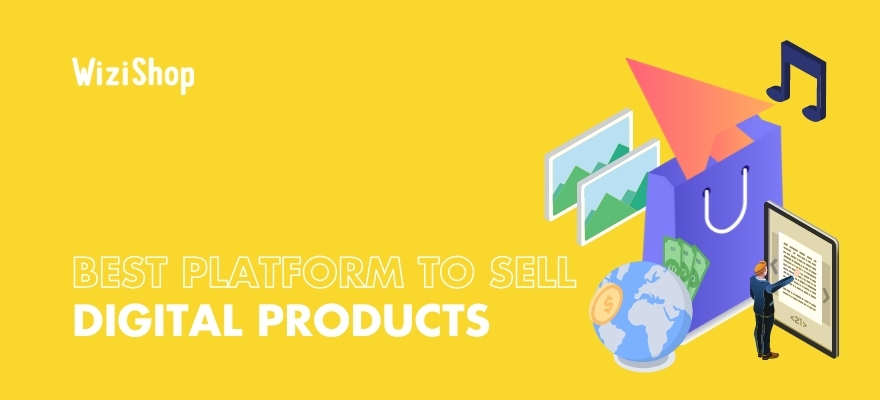In this article, you’ll discover the following:
- Some platforms support both physical and digital goods, while others are specialized for digital-only creators.
- Your platform choice should align with your strategic needs, such as marketing integrations, AI-assisted product descriptions, multilingual support, affiliate systems, and licensing management.
- Platforms offer a range of pricing structures: subscription based, transaction based, or flat monthly rates, making cost evaluation a critical step.
- Choosing the right solution depends on your goals, so it’s impotant to reflect on budget, time investment, whether this is a main gig or side hustle, and the level of professional features required.
- There are numerous kinds of digital products to sell, including ebooks, courses, fonts, music, memberships, templates, and more.
Becoming an entrepreneur in ecommerce has never been more accessible. What’s more, the ability to sell digital products as well as physical goods has made it easier to get your start in online sales even easier.
Ebooks, digital art, graphics, podcasts, software, photos, online courses, subscriptions…selling intangible assets like these comes with quite a few benefits for e-merchants and their customers alike!
Of course, with all the possibilities out there today, deciding what kinds of items you’d like to offer on your online store can take some time. However, once you have a great product idea in mind, you’ll still have another important question to answer: what’s the best platform to sell your digital products?
In this article, we will take a look at some of the top platforms of today and their pricing to help guide you in choosing the right one for you and bring you one step closer to ecommerce success!
No matter what digital products you wish to sell, it’s important to note that there are a number of factors to think about when choosing a platform for your business.
What kind of budget do you have? How much time are you able and willing to devote to developing your business, including working on a stellar marketing strategy? Is your entrepreneurial adventure meant to be a side hustle or your main source of income?
Once you’ve answered these questions, you’ll be able to more easily determine which platform is best suited for your endeavor. Here’s our list of the top platforms to consider to assist you with turning your entrepreneurial dreams into reality!
1. WiziShop
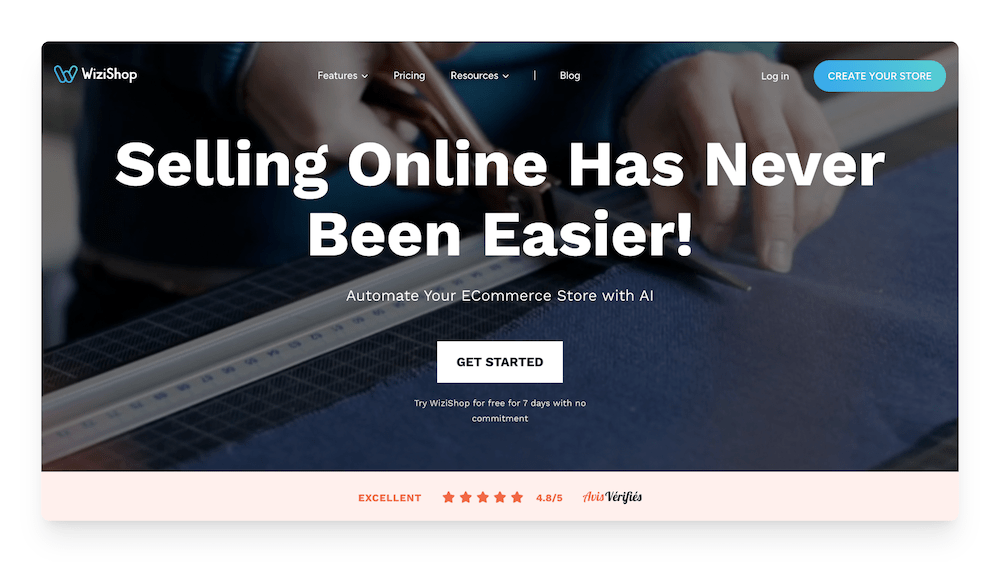
No matter if you’re new to the exciting world of ecommerce or have years of experience selling products online, using a first-rate platform can make all the difference in terms of how successful and enjoyable running your store is.
If you’re looking for a complete, all-in-one solution for selling digital and/or physical products, you will definitely want to check out the best ecommerce platform for a small business: WiziShop.
Key features
To start, you will find a great selection of design templates on the WiziShop platform, giving you the ability to build an online store that’s customized to suit your needs and that accurately reflects your brand. Furthermore, WiziShop stores are responsive to ensure an excellent rendering of your site regardless of what kind of screen your shoppers use when visiting it!
Another great advantage of using WiziShop to sell online is that our solution will be with you every step of the way of your ecommerce journey. There’s no need to worry if you’re launching your first ecommerce website and don’t have tons of experience with selling on the web.
As soon as you sign up on our platform, you’ll be able to access complimentary tutorials on a wide range of ecommerce topics. In addition, our Business Coaches, who undergo a significant amount of training, provide personalized assistance and support concerning any questions you may have about running your business and managing your website.
In addition to this support, you benefit from 24/7 assistance from Maia, your AI advisor trained to answer all your questions about ecommerce in general and the solution.
With more than 400 ecommerce tools already integrated at your disposal, you’ll have everything you need to take your marketing strategy to the next level and optimize your conversions, including abandoned cart email follow-ups, customer reviews, customizable messaging, discounts and promo codes, a variety of payment and delivery solutions, and much more.
In addition, WiziShop is the most SEO-optimized solution on the market. This is important, as SEO is one of the best strategies for the long-term success of any website.
Boasting 50+ powerful, user-friendly features designed to optimize your online store’s technical SEO, our solution helps you to climb the rankings on Google, giving you a leg up on the competition from the get-go!
Finally, you can also decide to add on the solution’s powerful new artificial intelligence (AI) that's built to help make writing all kinds of text for your website super easy. Simplify your marketing efforts by using the AI to generate product descriptions, titles and meta descriptions, translations, blog posts, and more!
Pricing
Enjoy a 7-day free trial to get started on the WiziShop platform. Afterwards, you’ll have a variety of subscription options at your disposal, allowing you to select the option that best suits your needs.
- Smart: Starts at $24.90/month + 2% transaction fee
- Business: Starts at $99.90/month + 1% transaction fee
- Enterprise: Starts at $1,300/month, with no transaction fees
Try WiziShop free for 7 days
THE EASIEST NO-CODE ECOMMERCE SOLUTION✅ No credit card required
✅ Access to all features
✅ No commitment
2. Etsy

Etsy is the marketplace for creators, crafters, and sellers of unique goods. Whether you make handmade items, offer digital creations, or sell vintage items, Etsy offers a global showcase to reach buyers looking for unique pieces.
Opening a store is simple, quick, and requires no technical background.
Key features
Etsy guides users through every step of the shop set-up process.
Note that, generally, storefronts look very similar to other sellers’ storefronts on the platform, which makes it more difficult to get your brand to stand out from the crowd.
However, Etsy recently released its Pattern tool, allowing users to create their own ecommerce sites for an extra monthly fee.
Another advantage of selling on this platform is its popularity. Business of Apps notes that Etsy had 96.6 million active buyers in 2024.
This means that you’d have a large built-in audience from the start!
You can also take advantage of a number of marketing tools, such as Etsy Ads and the ability to create coupons and discount offers to attract customers, as well as stats to keep an eye on your shop’s performance. The marketplace’s Etsy Seller app makes it easier for sellers to manage their operations on the go.
Pricing
If you’re considering selling your digital creations on the Etsy marketplace, keep in mind that there are several fees:
- Set-up fee: A one-time fee that ranges from $15 to $29
- Listing fee: $0.20 for every product that you list, regardless of if it sells
- Transaction fee: 6.5% of the product’s listing price plus the amount that you’ve charged for shipping (though you likely won’t be charging for shipping for digital goods)
- Pattern fee: If you use this tool to create your website, plan to be charged an additional $15/month after a 30-day free trial.
3. Podia
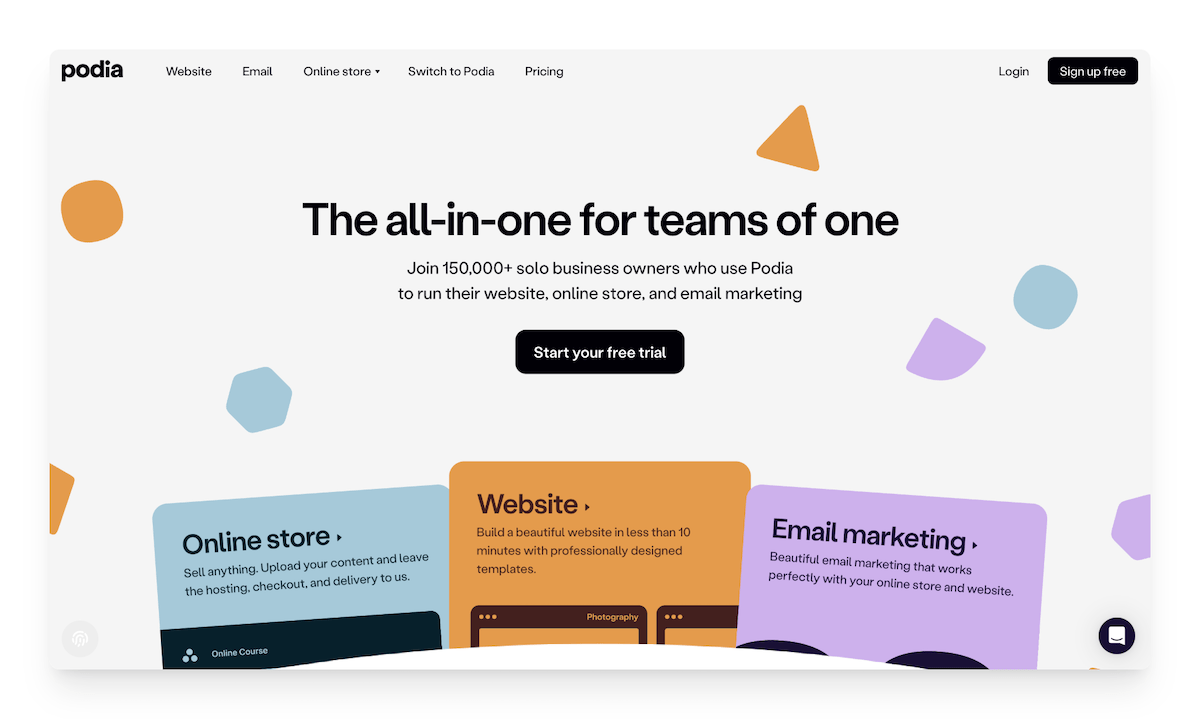
Podia is an ecommerce platform that focuses on selling digital products rather than physical products.
Users are able to create their own websites to sell intangible items like online courses, consultations, workshops, webinars, memberships, and one-off digital downloads such as audiobooks or ebooks.
Subscribers can also benefit from numerous tools designed to facilitate the online selling process.
Key features
With Podia, users are able to upload as many files and videos as they want. The platform supports up to 11 languages and more than 20 currencies, making it easier to go international with your business.
In addition, it offers a variety of integrations, such as with YouTube Live and Zoom…especially helpful for entrepreneurs whose digital products focus on e-learning or involve video in one way or another.
You manage your business from a single dashboard, with a clear interface, simple logic and no-surprise pricing.
The platform manages the entire sales cycle of your digital products: online courses, downloads, coaching, subscriptions, webinars, bundled sales, offers with coupons or payment plans. You can even issue training completion certificates, control the number of registrants or the duration of access to your content.
When it comes to emailing, Podia offers a comprehensive native tool, included in both plans for your first 100 subscribers. After that, you only pay according to volume. You can create automated campaigns, send newsletters, offer lead magnets, segment your lists or track the performance of your mailings.
As a bonus, Podia offers a blog, opt-in pages, a personalized domain, SEO tools, and all the integrations you need.
Pricing
E-merchants can test Podia at no charge for 30 days. After the month-long trial period is finished, users can choose from two different subscription plans:
- Mover: Starts at $33/month + 5% transaction fee
- Shaker: Starts at $75/month, with no transaction fees
4. Digital Product Delivery (DPD)
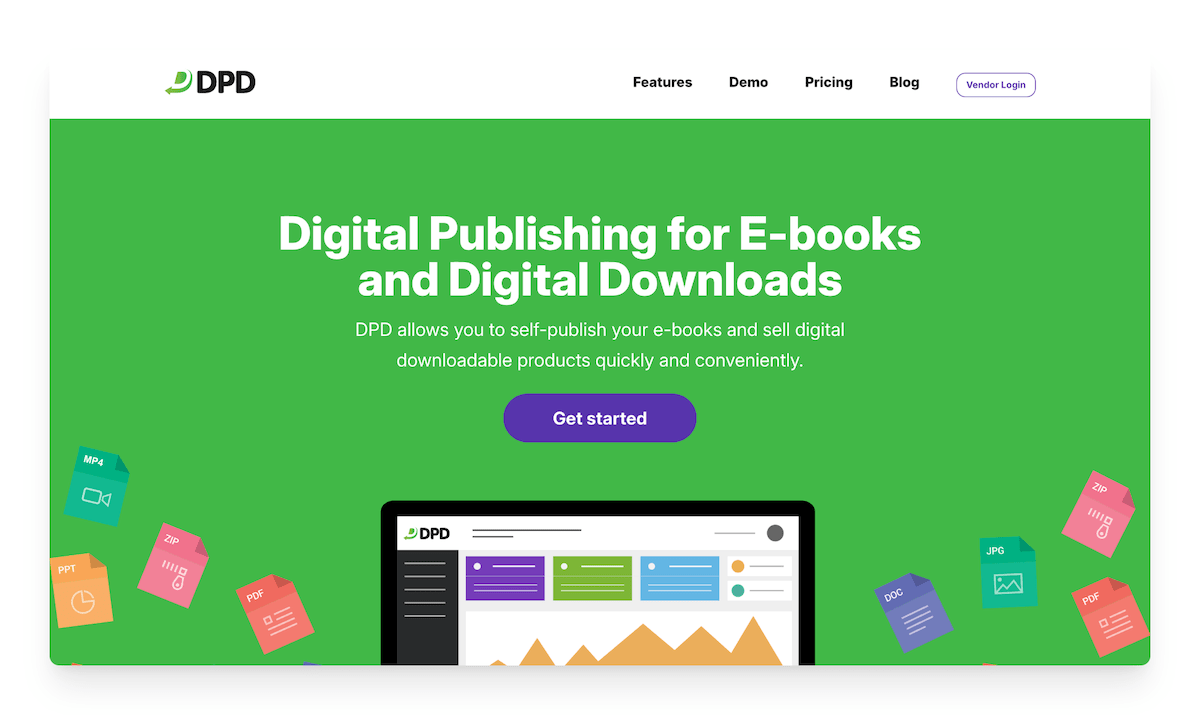
DPD is a digital publishing platform for selling non-physical products like ebooks, software, music, and more. With an emphasis on convenience, the company provides a plethora of tools to help make selling digital products a breeze.
Key features
When you use DPD, you have the option to create multiple stores under a single account. In addition, you can opt to sell individual products or create product bundles to further entice potential customers.
Users also get to enjoy a number of third-party sales and marketing integrations, including Google Analytics, MailChimp, Sendy, GetResponse, Campaign Monitor, and others.
Furthermore, when you update one of your digital products, the new version is automatically sent to shoppers who previously purchased the item to ensure an easy transition.
Pricing
DPD offers a 30-day free trial to see if the solution is right for your unique needs. The company has several flat-rate plans available, none of which include commission fees:
- 1 GB of product space, 20 total products: $10/month
- 2 GB of product space, 35 total products: $16/month
- 3 GB of product space, 60 total products: $22/month
- 6 GB of product space, 120 total products: $30/month
Considering offering subscriptions? If you sell subscriptions, DPD won’t charge you anything for the first 5 subscribers, but you’ll be charged $0.69/subscriber/month for subsequent subscribers.
5. Payhip
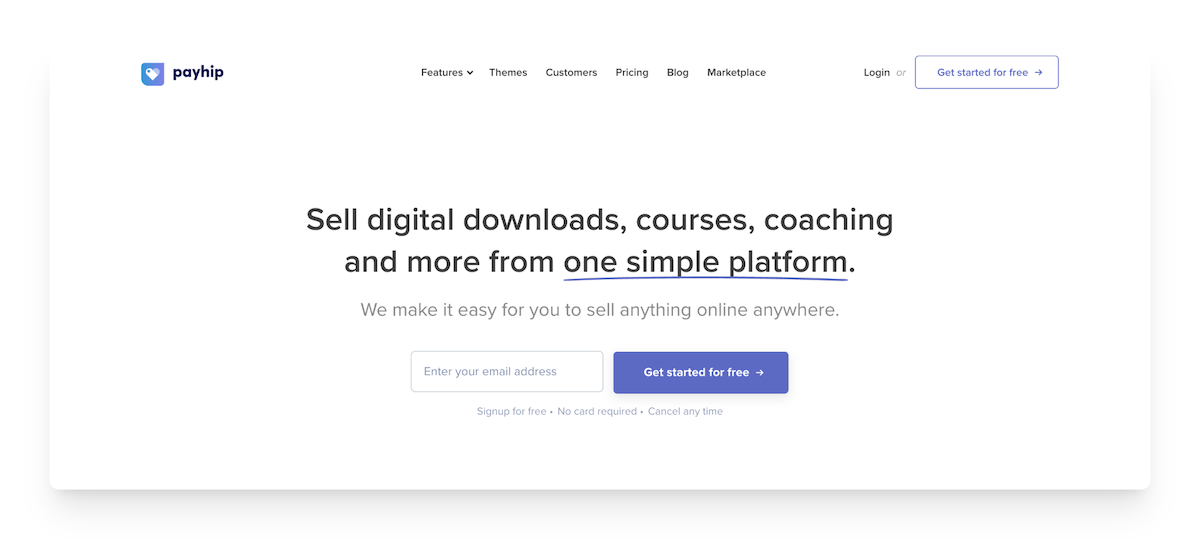
Payhip offers a user-friendly solution for sellers looking to earn money from their digital or physical creations. The platform is currently used by more than 130,000 sellers all over the world.
Key features
Whether you’re selling digital downloads, online courses, or memberships, you’ll have access to a range of tools on Payhip to support your growing business.
Platform users can sell their products on their ecommerce site or embed the responsive checkout and shopping cart directly on their blog or social media pages for added flexibility.
Payhip makes it possible to offer customers discounts, create mailing lists, and build your network with an affiliate system that encourages your buyers to promote your digital creations.
All this is accompanied by an intuitive dashboard, making it easy to track sales, customers and your performance.
Pricing
Payhip provides sellers with three different plans from which to choose, with all plans offering the same features and benefits but different transaction fees.
- Free Forever: $0/month + 5% transaction fee
- Plus: $29/month + 2% transaction fee
- Pro: $99/month, with no transaction fees
6. Teachable
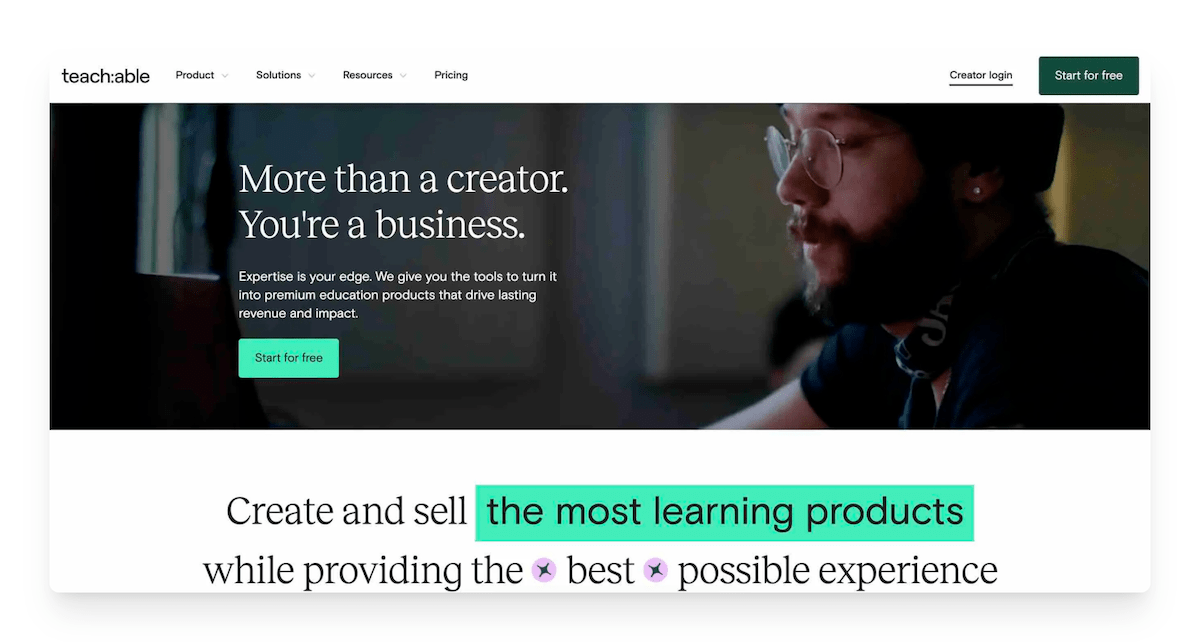
With over 100,000 instructors currently on Teachable, the site is one of the most popular platforms for e-learning, catering to entrepreneurs looking to sell online courses and coaching services.
Key features
Teachable offers various built-in tools specifically aimed to complement e-learning digital products, like quizzes, badges, comments, and completion certifications.
In addition, sellers can avail of numerous integrations, such as MailChimp, Google Analytics, Segment, Zapier, and others, to make running their businesses even easier.
What’s more, this solution permits you to offer your customers different payment plans, including free trials, installments, and subscription payments. Another bonus: the platform accepts payment in more than 120 currencies.
Thanks to its drag-and-drop editor, creating a course becomes almost as easy as writing a social media post.
Pricing
If you’re on the fence about using Teachable, you can take the platform for a test run free of charge for 14 days.
The platform has three paid subscription plans available:
- Basic: Starts at $39/month + 5% transaction fee
- Pro: Starts at $119/month, with no transaction fees
- Business: Starts at $499/month, with no transaction fees
7. Gumroad

The Gumroad ecommerce platform is especially targeted toward new online creators. You have the option to set up your online store on the platform itself or embed it on a site that you’ve already launched.
Key features
This solution makes it possible to provide various payment alternatives, including recurring payments, (monthly, quarterly, biannually, annually, etc.) for memberships, for example, as well as payments in different currencies.
If you sell a digital product that requires a license key, e.g., software, Gumroad can generate your license keys for you for added convenience.
What’s more, you’ll be able to offer multiple versions of a product, which can, for instance, help your ebook appeal to a greater number of consumers.
Gumroad sellers also have access to analytics to aid them in making decisions about their product offerings and business, say, for example, if they find that their online store isn’t selling as well as they’d hoped.
Pricing
With Gumroad, you only pay when you sell. There are no monthly fees, no commitments, and no surprises on your statement.
Here’s how it works in terms of the fees Gumroad charges:
- When your customers purchase through your Gumroad link or profile: 10% + $0.50 per sale
- If the buyer discovers you via the Gumroad marketplace: 30% per sale
8. Kajabi
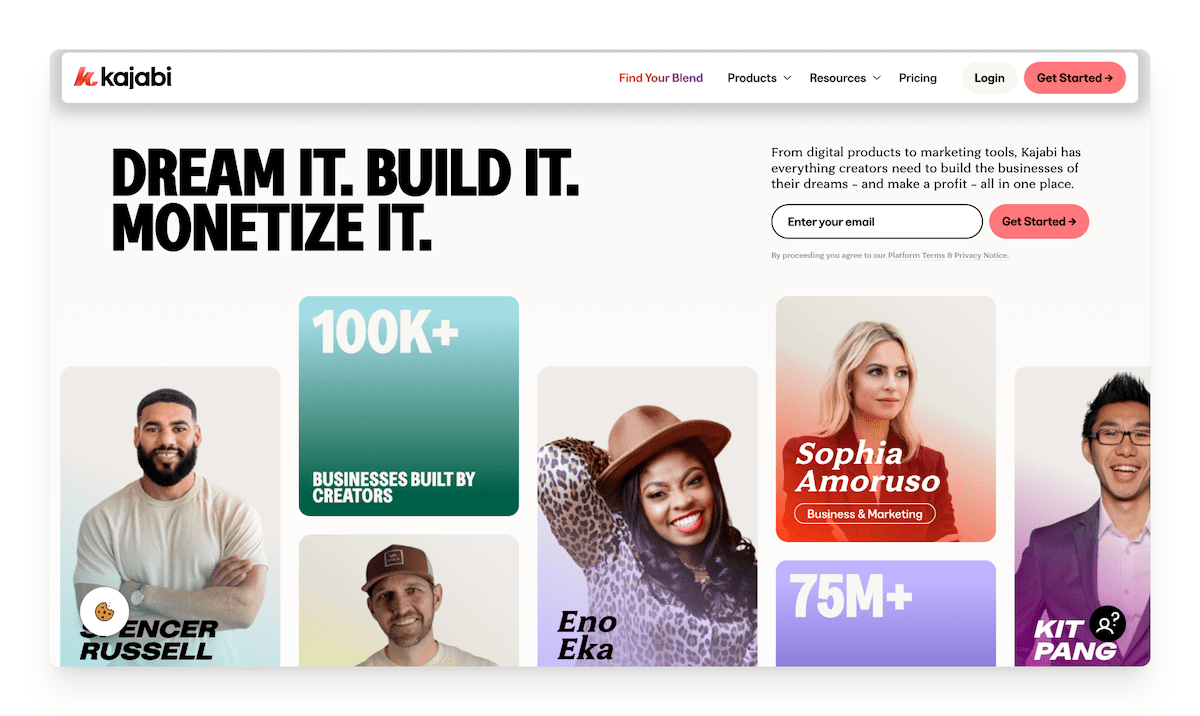
Whether you want to sell online courses, launch a coaching program, run a community, host a newsletter, or even offer podcasts, it's all here, under one roof, and there’s no need to use 10 different tools.
Kajabi lets you centralize your business, from content creation to sales, marketing, payments, contact management, and customer engagement. And you don’t even need to know how to code to take advantage of it.
Key features
Kajabi is a site builder, a drag-and-drop page editor, integrated sales tunnels, a CRM, unlimited email marketing, page templates, quizzes, certificates, evergreen courses, automatic subtitle generation, and even an AI tool to help you create your content.
Add to this a mobile app for your customers, community spaces (with forums, groups and lives), a recurring subscription management system, webinars, and you’ve got a complete ecosystem for building a real digital business.
So yes, Kajabi does require a certain investment, especially if you’re just starting out. But if your goal is to professionalize your business, centralize your tools and scale up without friction, it’s an option worth considering.
Pricing
- Kickstarter: Starts at $71/month
- Basic: Starts at $119/month
- Growth: Starts at $159/month
- Pro: Starts at $319/month
9. Thinkific

Another platform geared toward e-learning digital products, Thinkific is a popular option for e-merchants who want to share their knowledge with the world and simultaneously earn a profit while doing so.
Key features
No coding skills are required to create your online course on Thinkific. All it takes is a bit of drag-and-drop action! The platform permits different kinds of course content, including text, quizzes, Google Docs, video, and downloads.
In addition, you can design your own website on the platform and take advantage of a large number of branding and customization options.
Pricing
Similar to other platforms, Thinkific’s paid subscription options can be paid on a monthly or a yearly basis. Thinkific doesn’t charge users transaction fees, regardless of the plan chosen:
- Basic: Starts at $36/month
- Start: Starts at $73/month
- Grow: Starts at $146/month
- Thinkific Plus: Contact for a custom quote
10. MemberPress
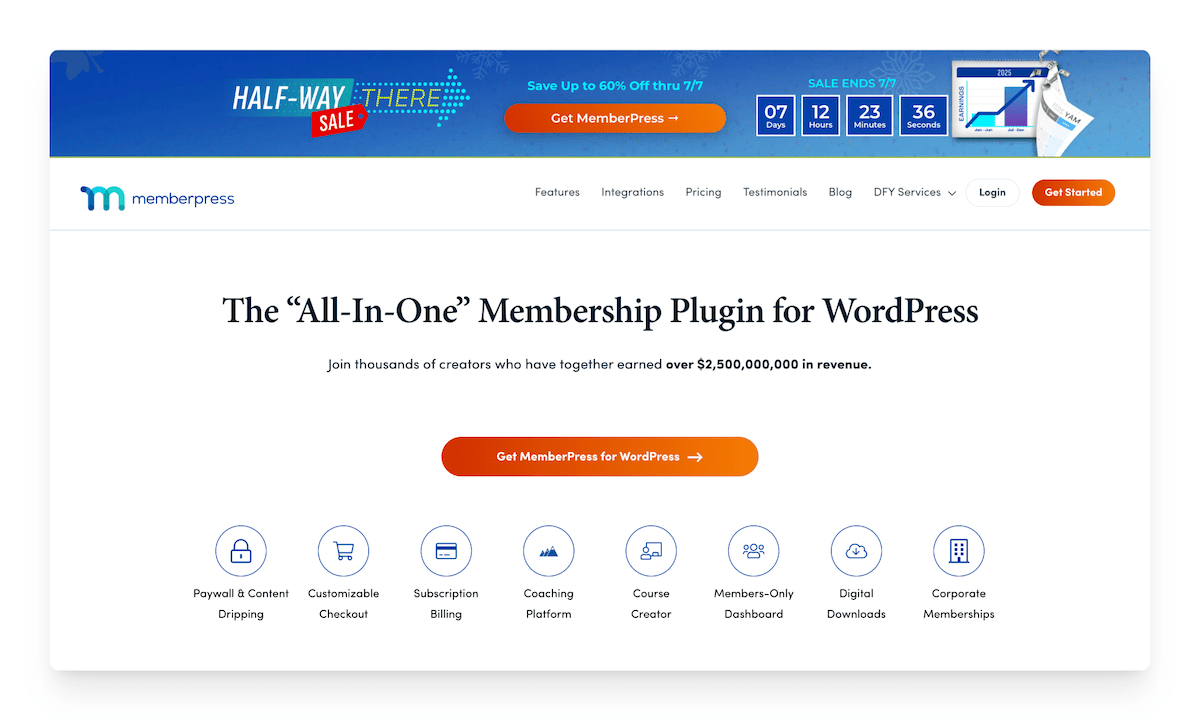
Different from other ecommerce solutions mentioned in this article, MemberPress is a WordPress plugin that sellers can add to their own websites to be able to sell memberships.
Ideal for users looking to offer subscriptions to their online-course content or other types of digital downloads, this plugin is especially beneficial if you have an existing WordPress that you’d like to monetize.
Key features
Besides making it possible to offer memberships on your website, MemberPress aims to ensure that managing those memberships is simple.
For example, you can choose what kind of content your customers have access to, such as pages, feeds, blog posts, categories, files, etc.
This tool also features in-depth integration options with Stripe, PayPal, MailChimp, and more, and it provides access to helpful analytics to aid you in determining your best-performing content.
Pricing
When signing up with MemberPress, you’ll find that you can choose from three different plans:
- Basic: $179.50/year
- Plus: $269.55/year
- Pro: $319.60/year
11. SendOwl
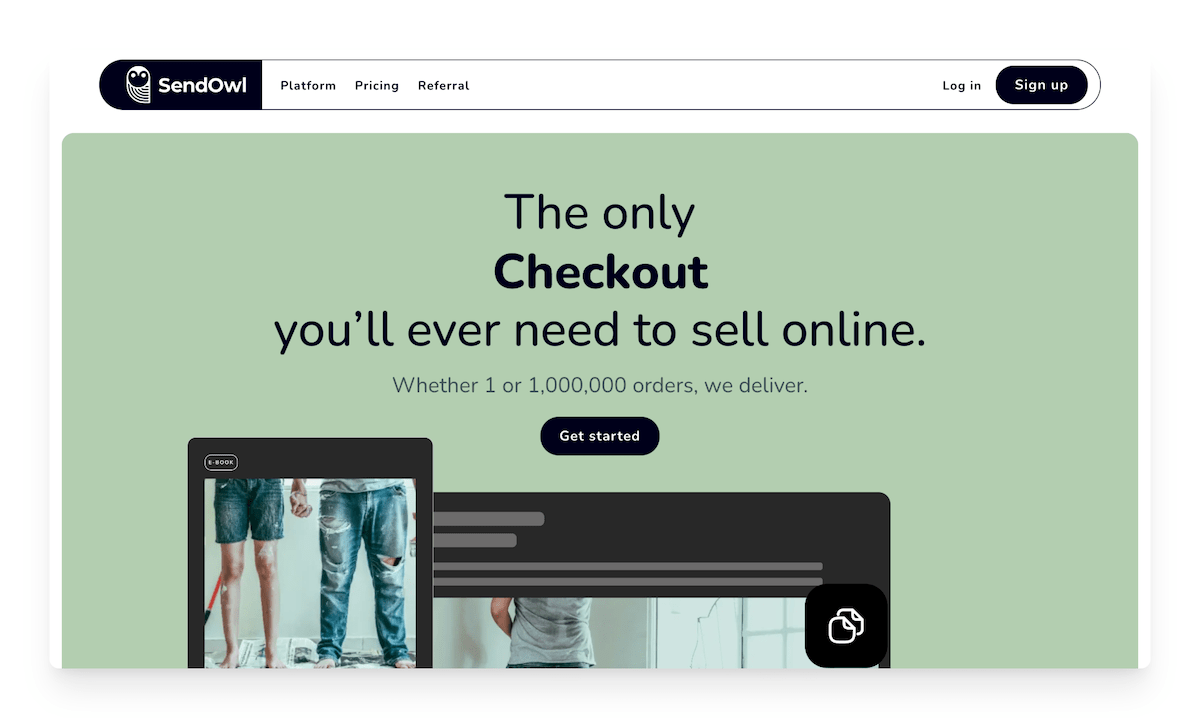
SendOwl is an add-on solution designed to assist people with existing websites or social media pages with selling online.
Created for sellers of all backgrounds and experience levels and businesses of all sizes, this platform allows for the selling of digital products, subscriptions, memberships, and tangible goods.
Key features
Supporting multiple languages and currencies and allowing for flexible payment choices, SendOwl’s responsive checkout helps to make the purchasing process as seamless as possible. It also provides users with several tools to boost sales, like cart abandonment emails, one-click upsells, discounts and promo codes, and more.
The platform’s advanced reporting and analytics make it easier to keep track of how well your online store is progressing.
Pricing
SendOwl offers e-merchants a 7-day free trial. After the week-long test period is up, there are several subscriptions from which to choose:
- Starter: $39/month
- Standard: $87/month
- Pro: $159/month
12. Easy Digital Downloads
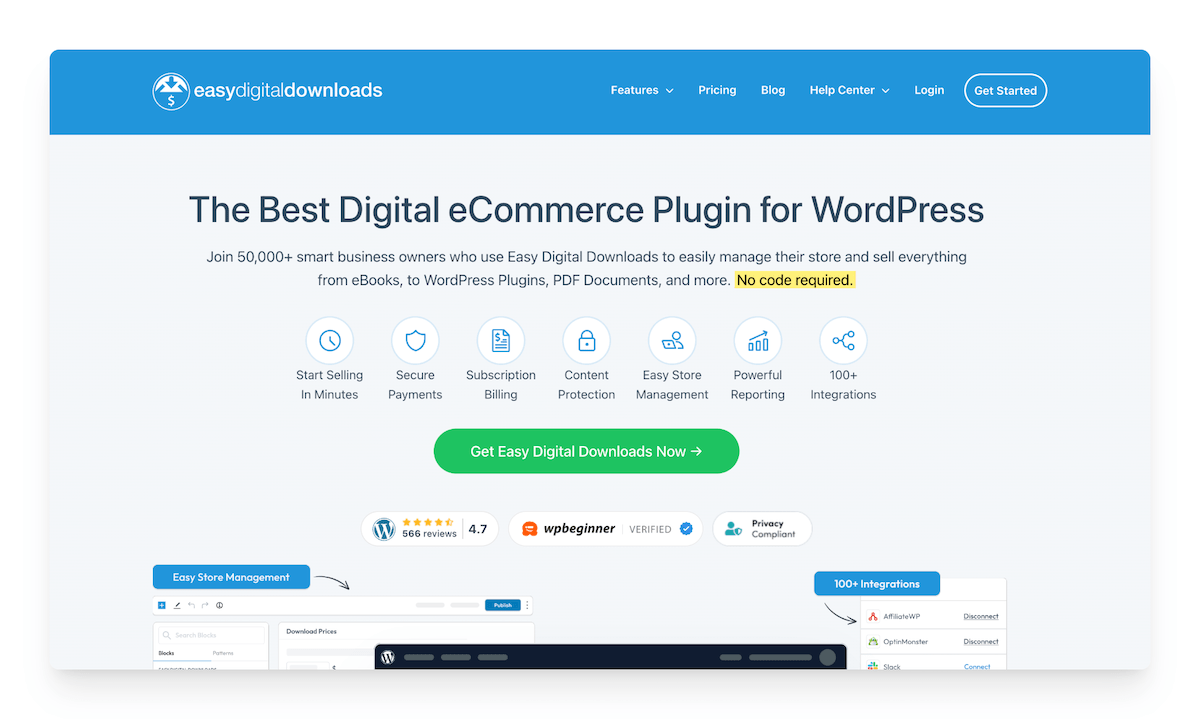
Another plugin available for use with WordPress sites, Easy Digital Downloads is simple to set up and use. It’s currently the online-selling solution in place for more than 50,000 website owners across the globe.
Key features
Easy Digital Downloads functions as a CRM in a WordPress dashboard and allows users to add buttons like “Buy now” and “Add to cart” directly to their WordPress websites in just a few clicks.
The plugin permits e-merchants to avail of various flexible payment solutions for their businesses, including Stripe, Apple Pay, Google Pay, and PayPal. It also offers customizable discount codes, detailed customer management, and analytics that can be viewed directly in the dashboard.
Pricing
Although Easy Digital Downloads doesn’t supply a free trial in the same way as some of the other solutions in this article do, the company does offer a 14-day money-back guarantee. This means that if you create your account on the platform and find that you aren’t satisfied with it, the solution will refund your money if you reach out within 14 days of signing up.
As far as pricing plans go, you’ll have four different choices:
- Personal: $99.50/year
- Extended: $199.50/year
- Professional: $299.50/year
- All Access Pass: $499.50/year
FAQ: Selling digital products
What kinds of digital products can you sell?
There’s a wide range of digital products that people can create and sell online. These products leverage digital technology and can be delivered electronically, making them convenient and accessible to a global audience.
The key advantage of digital products is that they can be created once and sold multiple times without the need for physical inventory or shipping, making them a popular choice for entrepreneurs looking to generate passive income or turn their expertise into revenue.
If you’re feeling lost as to where to start with your future business involving intangible goods, here are some of the top digital products to sell to inspire you!
- Ebooks: These downloadable digital books cover various topics from fiction and self-help to educational guides and tutorials. They cater to diverse interests and provide valuable information to a wide audience.
- Online courses: This kind of content includes structured lessons, videos, and resources covering subjects like skill development, arts, business, and more. Online courses accommodate diverse learning needs, can be accessed globally, and provide a flexible and scalable business model.
- Stock photos and videos: Businesses, marketers, and creators are increasingly relying on high-quality visuals for websites, social media, presentations, and more. By offering a diverse range of imagery, photographers and videographers can earn passive income, leveraging their work to meet the ever-growing need for compelling visuals in today’s digital landscape.
- Digital art: Combining creativity with accessibility, this category of goods includes illustrations, graphics, templates, and designs for personal or commercial use. Due to the various platforms available, artists can monetize their unique creations, making it a rewarding avenue for both exposure and revenue generation.
- Music and audio products: Musicians, producers, and sound designers can share their royalty-free music tracks, sound effects, audio loops, and even online music lessons, appealing to a wide audience. With easy digital delivery, creators can monetize their talents while providing music and sound enthusiasts with a range of auditory experiences to enjoy.
- Software and apps: Think intangible goods like tools, applications, plugins, and software scripts that solve specific problems or enhance productivity. More and more shoppers are willing to invest in digital solutions that streamline tasks, support their various business goals, or provide unique experiences, making the selling of software and apps a profitable venture for many entrepreneurs.
- Fonts and typography: Designers, businesses, and creatives often seek unique fonts to enhance visual identities. Possible options to create in this category include custom fonts, icon sets, and typography designs for graphic designers and creative professionals.
- Website templates and themes: These items simplify web development for individuals and businesses who may not be as comfortable with technology or web design. By offering visually appealing and functional designs, you can save buyers loads of time and effort when they want to build a website.
- Podcasts: If you're particularly passionate about a specific subject and love to talk, launching your own podcast involving that topic may be perfect for your future digital product business. With subscription models, exclusive content, and ad revenue, podcasts offer a monetizable platform for sharing meaningful content while generating income.
- Membership sites: Membership sites provide exclusive access to premium content, resources, or a community in exchange for a recurring fee. With this kind of subscription offering, you can establish a loyal customer base that values continuous access to valuable insights, courses, or services.
- Language learning resources: Products such as language courses, vocabulary guides, pronunciation tutorials, and language learning apps offer lots of profitability potential. Catering to diverse learners, you can offer structured courses, vocabulary guides, and interactive tools.
- Digital patterns and sewing templates: Consider supplying a range of designs to consider the needs of various projects. Customers can indulge their creativity and easily acquire patterns for various projects, and you’re able to discover a market of makers looking for customizable, reusable designs that empower buyers to express their individuality and crafting skills.
- Health and fitness resources: Workout plans, meal guides, meditation tracks, and fitness-related apps are all wonderful products that can help accommodate consumers’ widespread interest in wellness. Selling health and fitness resources allows you to address diverse fitness goals and offer a variety of great items that will best suit the needs of your target audience.
- Personal development resources: Personal development resources are valuable digital products thanks to the increasing demand for self-improvement. Think about offering goods such as guided journals, self-improvement guides, motivational speeches, and mindfulness resources to help people with diverse aspirations.
How do you sell a digital product?
Selling a digital product is the art of transforming expertise, skills or high value-added content into recurring revenue. Unlike a physical product, here there's no factory, no stock, no logistics: it's all about the creation, distribution and perception of value.
In concrete terms, here are the main steps involved in selling a digital product effectively:
- Identify a precise problem: The digital product is a clear response to a need. It's a guide that saves time, a template that gives structure, a training course that unblocks a situation. The more targeted it is, the more it sells.
- Create a 100% digital and duplicable product: Your product should exist entirely online and be easily reproduced without extra effort. It could be a PDF, video, audio file, or template—something customers can download instantly.
- Choose the right platform to distribute it: The platform you use should align with your audience and product type. Whether it’s your own website, a marketplace like Etsy, or a course platform like Teachable, the right choice makes purchasing smooth and builds trust.
- Treat the product listing as if it were a physical item: You’re selling the intangible, so you need to compensate with visual concreteness and tangible benefits. Screenshots, demo videos, testimonials, previews... this is what encourages shoppers to buy.
- Automate delivery: Once a purchase has been made, customers automatically receive their product by email or via their customer account. Zero friction = more conversions.
- Develop your marketing strategy: A great product needs visibility to sell. Use email marketing, social media, content creation, or paid ads to reach your audience. Highlight the problem your product solves and the value it offers.
👉 Our advice: Test a beta version to validate market appetite before investing days in an over-ambitious digital product. You can then move upmarket.
Are there digital product suppliers?
Yes, and it’s a lever that's still underestimated. If you don’t want to create your digital product yourself, or if you want to expand your catalog quickly, there are now suppliers specializing in white-label or “private label rights” (PLR) digital products.
- PLR product platforms
They enable you to buy ready-to-sell digital content—ebooks, training courses, templates—which you can then modify, rebrand, and market as if it were your own.
⚠️ Warning: Be sure to rework the content, change the branding, and adapt it to your audience. A raw PLR product = little perceived value.
- White-label marketplaces for digital resources
Here you’ll find products ready for resale, sometimes with an integrated (or optional) commercial license.
Where can you find suppliers of digital products to expand your catalog?
Creating is good. Delegating intelligently is even better when you want to move fast and scalably. If you don’t produce all your digital content in-house, you have several options for expanding your catalog without sacrificing quality.
- Collaborate with freelance creators
Talented freelancers are looking for distribution channels. By becoming their partner, you can offer the following:
Talented freelancers are looking for distribution channels. By becoming their partner, you can offer the following:
- original ebooks,
- royalty-free graphics or music packs, or
- custom scripts or software.
Explore: Fiverr, Upwork, Malt, LinkedIn
- Opt for white-label products
Some sites provide you with ready-to-sell content with specific licenses: private label rights (PLR), master resell rights (MRR)... ideal for reselling on your behalf.
Where to look:
- PLR.me: very high quality, especially for coaching, wellness and productivity niches.
- IDPLR: huge library (ebooks, videos, templates).
- BigProductStore: excellent quantity/price ratio.
- BuyQualityPLR: very good marketing and personal development section.
- Creative Market, Design Bundles, Etsy: (yes, some sellers offer digital bundles with commercial rights).
- Digistore24 or ClickBank: mainly for affiliate marketing, but some products can be resold directly with license.
Now that you know all the secrets of selling digital products, all you have to do is choose the best ecommerce platform for your needs.
Before you make your choice, take the time to ask yourself the right questions:
- What is your initial budget?
- How much time can you devote to it?
- Is this a side project or a core business?
- Do you need advanced features (automations, sales tunnel, video hosting, affiliate marketing system...)?
- Would you like to sell internationally, whether via applications, the web, or even directly on social networks?
- And why not offer digital products such as books or training courses? The advantages for your company are many: low production costs, immediate availability, and comfortable margins.
The ability to sell digital products creates a whole new opportunity for today’s ecommerce entrepreneurs.
When it comes time to choose your platform for selling your intangible creations, be sure to consider your options carefully. Remember that many of the platforms on this list offer free trials, allowing you to test the waters before committing to a subscription.
As a reminder, with WiziShop, you’ll have 7 days to give the AI-powered ecommerce solution a try and discover all the powerful features that can help you to sell digital products and succeed in online sales.
Check WiziShop out today and see for yourself why it’s the best ecommerce solution around!
Try WiziShop free for 7 days
THE EASIEST NO-CODE ECOMMERCE SOLUTION✅ No credit card required
✅ Access to all features
✅ No commitment


